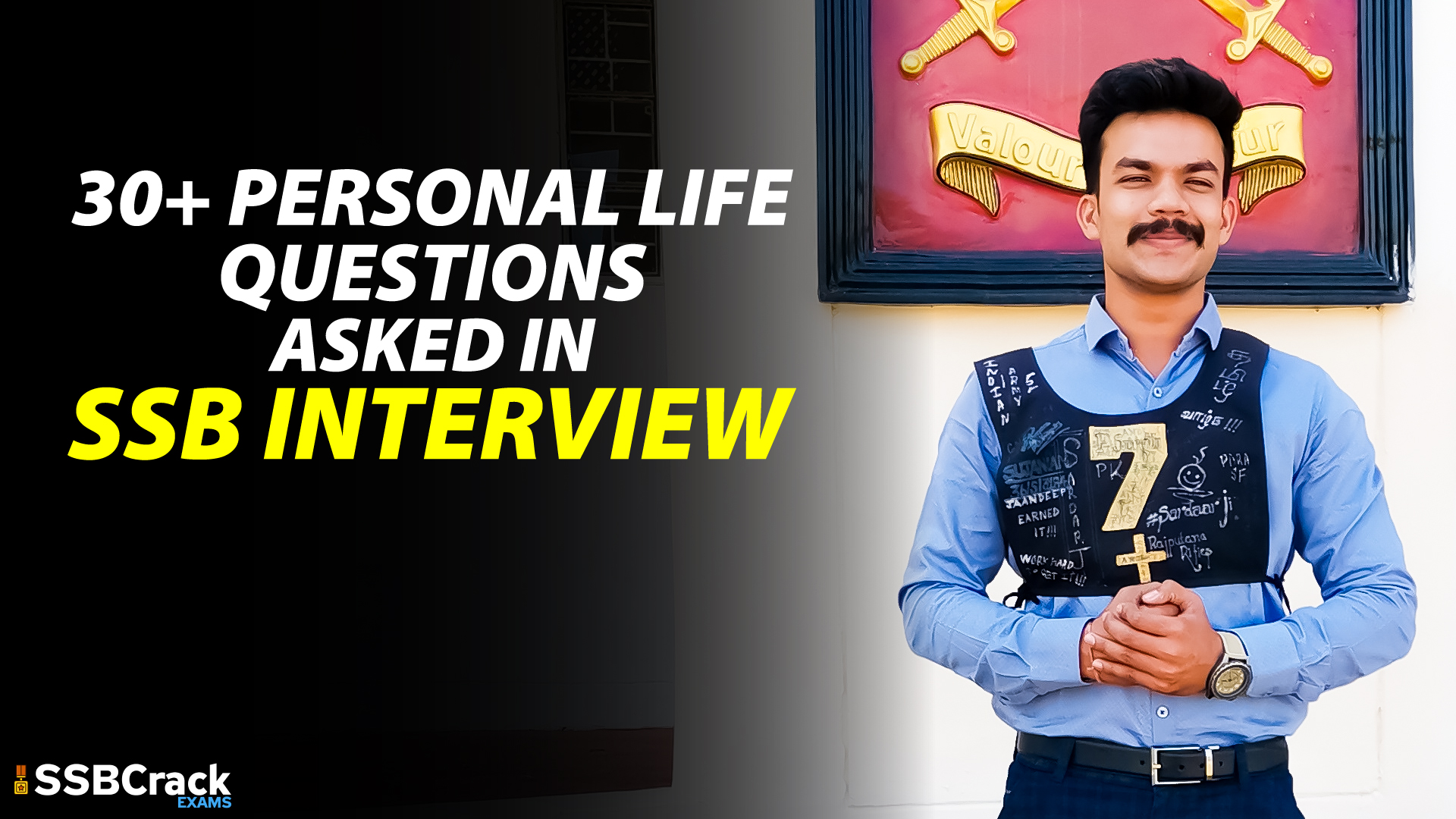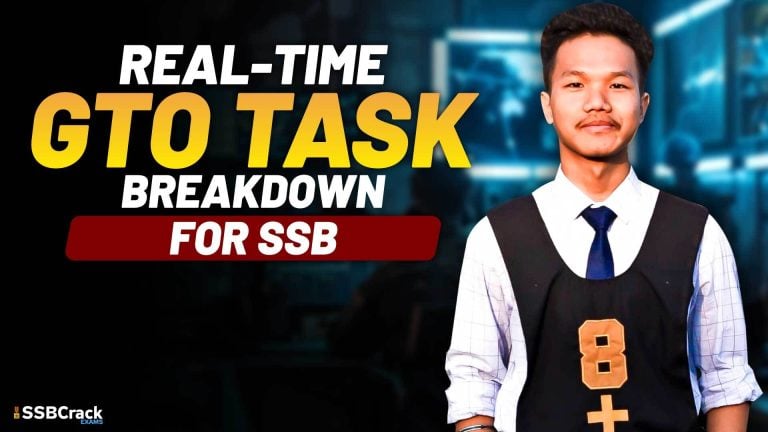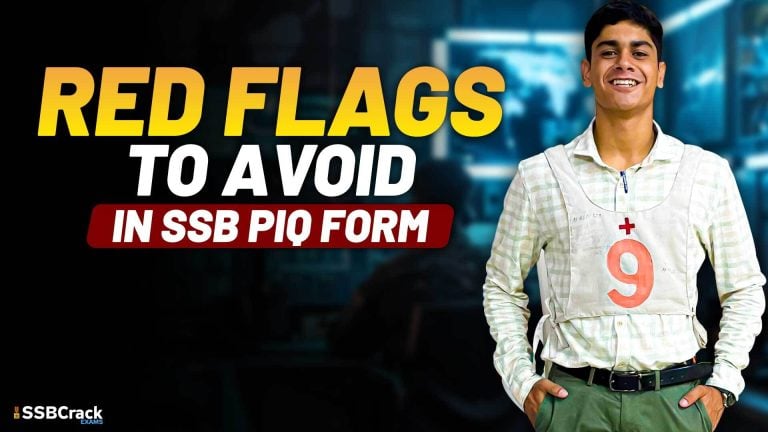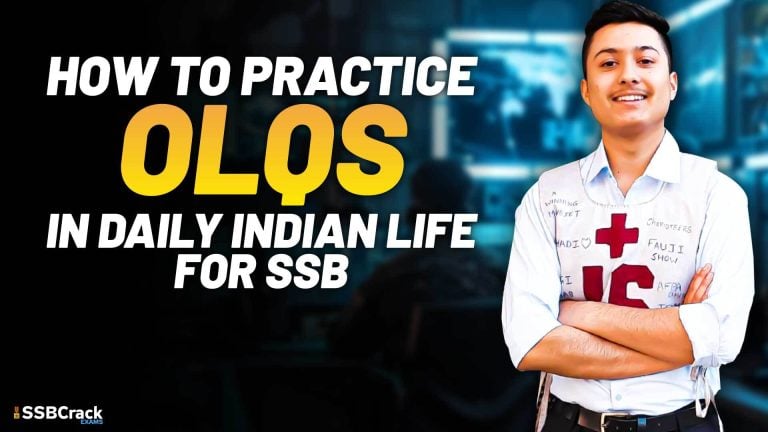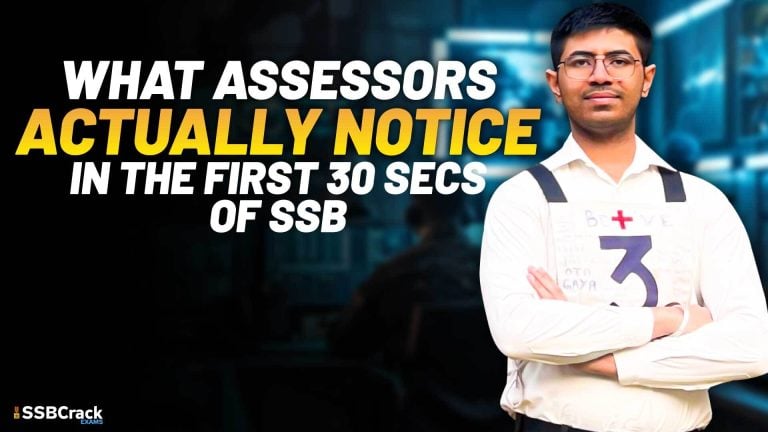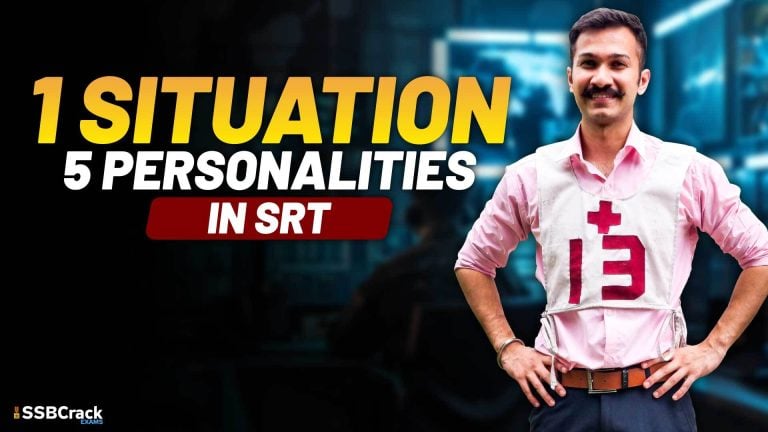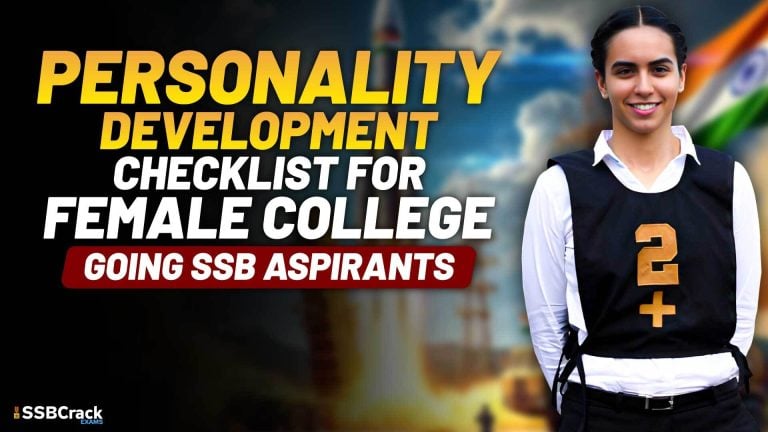During the Services Selection Board (SSB) interview, candidates face numerous questions about their personal lives. These questions serve a strategic purpose: to evaluate a candidate’s mental clarity, emotional intelligence, decision-making ability, and authentic personality. The interviewer assesses how candidates respond to sensitive topics and whether their answers reveal the qualities necessary for military leadership.
This comprehensive guide covers common personal questions asked during SSB interviews along with effective response strategies.
Why Personal Questions Matter in SSB Interview
Personal questions reveal:
- Clarity of thought under pressure
- Emotional maturity and stability
- Decision-making approach
- Authenticity and honesty
- Core values and principles
- Self-awareness and reflection abilities
Personal Life Questions Asked In SSB Interview
Family and Relationships
1. Who is more important to you, your mother or father?
Sample Answer: “Both my parents are equally important to me, but in different ways. My father has instilled discipline, courage, and analytical thinking in me through his approach to challenges. My mother has taught me empathy, patience, and resilience through her nurturing nature. Their complementary influence has shaped me into a balanced individual. I value them equally and cannot place one above the other as they both contribute uniquely to my development.”
2. Do you watch porn?
Sample Answer: “I understand that this question aims to assess my honesty and values. While I recognize that curiosity about such content is normal for many young adults, I personally focus my free time on productive activities like physical training, reading, and developing skills relevant to my career goals. I believe in maintaining healthy perspectives about relationships and intimacy through more constructive sources of information.”
3. Do you have a BF/GF? Tell me about him/her.
Sample Answer: “Yes, I have been in a relationship for the past two years. My partner is pursuing engineering and shares my values of hard work and integrity. Our relationship is based on mutual respect and support for each other’s goals. We encourage each other’s professional growth and understand that personal ambitions sometimes require sacrifices. This relationship has taught me effective communication, compromise, and how to balance personal and professional responsibilities.”
Personal Growth
4. What is your biggest strength? Give me an example where it helped you.
Sample Answer: “My biggest strength is my ability to remain calm under pressure. During my NCC camp last year, we faced a sudden change in training schedule due to adverse weather conditions. While many cadets became anxious, I quickly analyzed the situation and helped reorganize activities. I gathered the squad leaders, proposed alternative indoor training exercises, and helped implement them within 30 minutes. This allowed the training to continue effectively despite the disruption. This strength would be valuable in military situations where unexpected challenges are common.”
5. What are your weaknesses? What do you do to improve them?
Sample Answer: “One weakness I’ve identified is occasional over-analysis before making decisions, which can delay action in time-sensitive situations. To address this, I’ve implemented a personal rule to set time limits for decisions based on their importance. I’ve also placed myself in leadership positions during college events where quick decisions are necessary. For instance, during our inter-college sports meet, I had to make immediate decisions about team substitutions, which has helped me improve my decisiveness. I maintain a journal to reflect on these experiences and track my improvement.”
6. What is your biggest pride in life?
Sample Answer: “My biggest pride is establishing a community tutoring program in my neighborhood for underprivileged children. Identifying that many local kids couldn’t afford coaching, I mobilized fellow college students to volunteer two hours weekly. Starting with just 5 students, we now mentor 25 children. Seeing three of our students secure scholarships last year gave me immense satisfaction. This initiative taught me organization, leadership, and the impact of service beyond self—values central to military life.”
7. Who is your role model? What do you do to shape your personality like that?
Sample Answer: “Field Marshal Sam Manekshaw is my role model for his exceptional leadership during challenging circumstances and his integrity. To shape my personality like him, I study his decisions and leadership style through books and documentaries. I practice his principle of speaking truth to authority by being honest with my teachers and team leaders, even when it’s difficult. I’ve also adopted his disciplined daily routine and work to develop his ability to make tough decisions while keeping team welfare in mind. Recently, as the captain of my college basketball team, I faced a situation where I had to bench a friend for the finals because another player was performing better—a decision that required putting team success above personal relationships.”
8. What is your career plan? What will you do if you are not selected in the SSB?
Sample Answer: “My primary career goal is to serve in the armed forces as an officer. I’ve planned my preparation methodically by strengthening my physical fitness, knowledge of current affairs, and leadership skills through NCC and college activities. If not selected in this SSB attempt, I will analyze the feedback, work on identified areas of improvement, and reapply. Meanwhile, I’ll complete my degree in mechanical engineering to ensure I have professional qualifications. If after multiple sincere attempts I’m not selected, I plan to join the technical branch of a public sector defense organization where I can still contribute to national security while using my technical expertise.”
9. What is the meaning of your name?
Sample Answer: “My name ‘Arjun’ is derived from Sanskrit and means ‘white, clear, or bright.’ It’s also the name of the skilled archer and warrior from the Mahabharata who symbolizes focus, skill, and duty. Learning about the meaning and historical significance of my name has inspired me to develop clarity of thought, precision in action, and dedication to duty—qualities that align well with military values. I strive to embody these attributes in my actions and decision-making.”
10. Will you act differently if you were given a different name?
Sample Answer: “I believe our core personality and values stem from our upbringing, experiences, and conscious choices rather than our name. While names can influence how others initially perceive us or create certain expectations, my fundamental values of integrity, discipline, and service would remain unchanged regardless of my name. These principles are deeply ingrained through my family values and personal experiences. A different name might present different initial expectations, but my actions and decisions would continue to reflect the same core character I’ve developed.”
Decision Making and Learning
11. Tell me about a wrong decision you have taken in your life.
Sample Answer: “In my second year of college, I decided to take on leadership positions in three different clubs simultaneously, believing I could manage everything effectively. This overcommitment led to declining academic performance and inadequate attention to each responsibility. Three months into this arrangement, I realized my mistake when we missed an important submission deadline for a technical competition. I learned that effectiveness requires focus and quality commitment rather than quantity. I subsequently prioritized two key activities where I could make meaningful contributions while maintaining academic excellence. This experience taught me about resource management and setting realistic priorities—skills essential for effective military leadership.”
12. Tell me about any mistake in your life and the lessons you have learned.
Sample Answer: “During a trekking expedition I organized for my college group, I failed to thoroughly research weather patterns for the region. Despite having checked the general forecast, I missed information about sudden afternoon storms common in that area. Our group was caught in an unexpected downpour halfway through the trek, creating a potentially dangerous situation. While we managed to find shelter and ensure everyone’s safety, this incident taught me the critical importance of comprehensive preparation and considering worst-case scenarios. Now, for any responsibility I undertake, I research exhaustively, create contingency plans, and ensure I’m prepared for unexpected developments—an approach crucial for military operations.”
13. If you have to travel by train, whom would you prefer to go with? Friends, family, or alone and why?
Sample Answer: “My preference would depend on the purpose of the journey. For leisure travel, I enjoy going with friends as it allows for shared experiences and strengthens bonds through navigating new situations together. For important events like family functions, I prefer traveling with family to spend quality time and support each other. However, I also value traveling alone occasionally, especially for professional commitments or personal development trips, as it builds self-reliance and adaptability to new environments without familiar support systems. I believe this balanced approach develops both team compatibility and independent decision-making—both essential qualities for military officers.”
14. What is the biggest goal of your life?
Sample Answer: “My ultimate goal is to serve the nation with distinction while continuously growing as a leader who positively influences others. In the immediate term, this translates to becoming an effective military officer who can lead troops with competence and compassion. In the longer term, I aspire to contribute to strengthening India’s security framework through dedicated service and potentially specializing in areas like counter-terrorism or strategic planning where I can maximize my impact. Beyond professional achievements, I aim to inspire younger generations to consider service to the nation as a meaningful career path.”
15. What motivates you? How do you overcome failures?
Sample Answer: “I’m primarily motivated by the desire to make a meaningful impact and the satisfaction of overcoming challenges through disciplined effort. The opportunity to push my boundaries and grow through new experiences keeps me driven. When facing failure, I follow a structured approach: first, I allow myself a brief period to acknowledge disappointment; then I conduct a thorough analysis of what went wrong without making excuses; next, I identify specific improvements needed; finally, I develop and implement an action plan with measurable milestones. For example, when I failed to qualify for the state-level athletics competition last year, I analyzed my performance, identified weaknesses in my starting technique, created a focused training plan, and successfully qualified this year.”
Personal Preferences and Habits
16. What are the qualities that you like in your friends and what do you dislike the most?
Sample Answer: “I value integrity, reliability, and constructive honesty most in my friends—people who stand by their word and offer genuine feedback for improvement rather than mere validation. I appreciate friends who push me to grow and share a similar drive for excellence. What I dislike most is inconsistency between words and actions, or people who prioritize momentary comfort over long-term growth. For instance, I respect friends who point out when my preparation for an event is inadequate rather than those who offer false reassurance. These preferences reflect my belief that meaningful relationships should contribute to mutual growth and character development.”
17. Tell me about your daily schedule, how much time do you use social networking sites and surf internet?
Sample Answer: “My day typically starts at 5:30 AM with physical training for an hour, followed by academics or professional work from 8:00 AM to 5:00 PM with appropriate breaks. Evenings include sports or NCC activities for 1-2 hours, followed by current affairs study and preparation for defense examinations. I limit social media to 30 minutes daily, primarily using platforms to follow defense news portals, connect with mentors in services, and stay updated with my peer group. For internet usage, I spend about an hour daily on structured learning through specific websites and online courses related to military history, leadership, and technical skills relevant to defense services. I believe in using technology as a tool for growth rather than passive consumption.”
18. Tell me about all the co-curricular activities you have participated in.
Sample Answer: “I’ve participated in diverse co-curricular activities that have developed different facets of my personality. In NCC, I’ve attended three Annual Training Camps and one Thal Sainik Camp, earning a ‘B’ certificate. I’ve represented my college in debate competitions at the state level, which has enhanced my analytical thinking and public speaking. In sports, I play basketball as team captain and have participated in district-level competitions. I also volunteer with a local NGO for environmental conservation, organizing monthly clean-up drives. Additionally, I’m an active member of my college’s adventure club, having participated in two high-altitude treks and a basic rock climbing course. These varied activities have built my physical endurance, team coordination, leadership, and crisis management abilities.”
19. How do you spend your free time?
Sample Answer: “I utilize my free time in activities that contribute to both relaxation and personal development. Physical fitness remains a priority, so I dedicate time to running and strength training. I read extensively, focusing on military history, leadership, and geopolitics—recently completing ‘India’s Wars’ by Arjun Subramaniam. I also enjoy strategic games like chess that develop tactical thinking. Additionally, I volunteer as a fitness trainer for NCC juniors on weekends, which helps me practice leadership while giving back to an organization that has shaped me. For pure recreation, I enjoy landscape photography during outdoor excursions, which helps me develop patience and attention to detail while appreciating nature.”
20. Which place do you want to visit in your life and why?
Sample Answer: “I aspire to visit Siachen Glacier to gain firsthand perspective of the extreme conditions under which our soldiers serve at the world’s highest battlefield. My interest stems from deep respect for the exceptional endurance and resilience required to defend this strategic position despite temperatures dropping below -50°C. As someone pursuing a military career, I believe experiencing even briefly what soldiers endure during long deployments there would provide invaluable insight into the realities of service and sacrifice. Such an experience would strengthen my commitment to serve and enhance my appreciation for the challenges faced by troops in extreme environments.”
21. Tell me about 2 national and international issues.
Sample Answer: “A critical national issue is water security. With 18% of the global population but only 4% of freshwater resources, India faces severe challenges. Agricultural demands, industrial usage, and urbanization are creating competing pressures. The situation affects national security as water disputes arise between states and with neighboring countries. I believe integrated water management combining traditional knowledge with modern technology offers sustainable solutions.
Internationally, climate change poses multidimensional security challenges. Beyond environmental impacts, it creates resource scarcity leading to migration and conflict. For military forces, it means more disaster relief operations and potential border tensions due to changing resource availability. This requires defense forces to adapt operational capabilities while nations develop collaborative approaches to address root causes—making it both an environmental and security challenge.”
22. What is your favorite cuisine? Do you know how to prepare it?
Sample Answer: “My favorite cuisine is Punjabi food for its rich flavors and nutritional balance. I particularly enjoy Rajma Chawal (kidney beans curry with rice). Yes, I can prepare it from scratch, starting with soaking kidney beans overnight, then pressure cooking them with onions, tomatoes, and a blend of spices like cumin, coriander, and garam masala. The preparation takes about 1.5 hours total. I learned cooking as a self-sufficiency skill during my first year of college and have since expanded my repertoire. Cooking has taught me patience, resource management, and attention to detail—qualities that translate well to military life where adapting to available resources and maintaining morale through good nutrition can be important practical skills.”
23. Who is a better child, you or your siblings? Justify why do you think so.
Sample Answer: “I don’t believe in ranking family members as ‘better’ or ‘worse’ since we each contribute differently to our family. My sister excels academically and has a methodical approach to challenges, while I bring leadership abilities and emotional strength during family difficulties. For instance, when our grandmother was hospitalized last year, my sister managed the medical documentation and insurance paperwork meticulously, while I coordinated family members’ hospital visits and maintained everyone’s morale. Our parents value both our contributions equally. This perspective—appreciating complementary strengths rather than competitive comparison—is something I would carry into military leadership, recognizing that different team members bring valuable and diverse strengths.”
Relationships and Conflict Resolution
24. Tell me about those people who are in your close relationship. What all things do you people share and tell me about an incident when you had an argument, and how did you solve that?
Sample Answer: “My closest relationships include my parents, my childhood friend Rahul, and my college roommate Vikram. With my parents, I share career aspirations and values; with Rahul, I share my passion for sports and outdoor activities; with Vikram, I discuss academic challenges and leadership experiences. Last year, Vikram and I had a significant disagreement while co-organizing a college technical symposium. We had conflicting views about budget allocation—I prioritized quality speakers while he emphasized extensive marketing. The tension grew when we inadvertently undermined each other in planning meetings. Recognizing the deteriorating situation, I initiated a private conversation where we each presented our reasoning with supporting data. We identified our shared goal of maximizing event impact and developed a balanced approach incorporating both perspectives. This experience reinforced my belief in addressing conflicts directly through data-driven discussions rather than emotional reactions.”
25. Tell me about one of your failures and how did you overcome that?
Sample Answer: “A significant failure was when I couldn’t clear the physical fitness test for a national-level NCC camp despite four months of preparation. The failure was particularly disappointing as I had been overconfident and neglected improving my upper body strength, focusing only on running endurance. After the initial disappointment, I conducted an honest self-assessment and consulted a senior who had successfully attended the camp. I developed a comprehensive fitness plan addressing all aspects—strength, endurance, flexibility, and recovery. I maintained a detailed progress journal, adjusted training based on performance data, and ensured consistency even during exam periods. Six months later, I cleared the same test with marks well above the minimum requirement. This experience taught me the importance of comprehensive preparation, seeking expert guidance, and converting failure into a structured opportunity for improvement—principles applicable to any military challenge.”
Career Motivations
26. Why do you want to join the forces?
Sample Answer: “My desire to join the forces stems from multiple factors that have aligned through my life experiences. Growing up near an army cantonment, I witnessed firsthand the discipline, purpose, and camaraderie that defines military life. This early exposure created deep respect for the profession. As I matured, I recognized that military service offers the unique opportunity to combine physical excellence, intellectual challenge, and leadership development while serving a purpose greater than oneself. The armed forces’ emphasis on character development resonates with my personal values of integrity, courage, and selfless service. Additionally, I believe my abilities in strategic thinking, physical resilience, and people management would be optimally utilized in a military environment. Ultimately, I see no greater privilege than serving the nation by leading troops and contributing to national security.”
27. Which regiment do you want to join if you crack the SSB interview?
Sample Answer: “While I understand that regiment allocation depends on service requirements and merit position, if given a choice, I would prefer the Gorkha Rifles. My interest stems from their remarkable history of valor and their unique regimental ethos that balances fierce fighting spirit with disciplined professionalism. During my NCC attachment with a Gorkha unit, I was deeply impressed by their organizational culture that emphasized both combat excellence and strong officer-soldier relationships. Their operational versatility—performing effectively in various terrains from high-altitude areas to counterinsurgency operations—aligns with my interest in diverse military challenges. However, I’m prepared to serve in any regiment with equal dedication, as ultimately, it’s the opportunity to lead soldiers and serve the nation that matters most to me.”
Personal Beliefs and Preferences
28. Do you believe in God?
Sample Answer: “Yes, I do believe in a higher power that provides moral guidance and inner strength, particularly during challenging situations. However, my faith is personal and doesn’t interfere with rational decision-making or respect for diverse perspectives. In a military context, I believe spiritual strength can be a source of resilience while maintaining that service duties always take precedence over religious practices. I respect all faiths equally and understand that in the armed forces, I would lead soldiers from diverse religious backgrounds, requiring sensitivity and equal respect for all beliefs. This balanced approach allows spirituality to be a source of personal strength without compromising professional duties or inclusivity.”
29. Suppose God has granted you 5 wishes, what would they be?
Sample Answer: “If granted five wishes, I would ask for: first, the wisdom to make decisions that positively impact others beyond myself; second, the courage to stand by principles even when facing adversity; third, the strength to push beyond perceived limitations in serving the nation; fourth, the ability to inspire and bring out the best in teams I lead; and fifth, the health and well-being of my family so I can focus completely on my duties. I’ve deliberately chosen wishes that enhance capabilities rather than granting easy success, as I believe meaningful achievement comes through earnest effort and character development, not shortcuts.”
30. Tell me about your favorite movie. Why do you like it?
Sample Answer: “My favorite movie is ‘Lakshya,’ which portrays the journey of an aimless young man who transforms into a focused and courageous army officer during the Kargil War. I appreciate how it realistically depicts both the challenges of military training and the psychological growth of the protagonist. The film resonates with me because it shows that excellence in military service requires not just physical strength but mental resilience and clarity of purpose. The portrayal of military operations maintains a balance between showcasing the harsh realities of combat while highlighting the strategic thinking involved. The character development demonstrates how military service can bring out latent potential and shape individuals into leaders—a journey I aspire to undertake myself.”
31. Which subjects have you studied during your school time and why did you choose them?
Sample Answer: “In higher secondary school, I chose Physics, Chemistry, Mathematics, and Computer Science. I selected this science stream because I was naturally drawn to understanding the fundamental principles governing the physical world. Physics improved my analytical abilities and helped me understand the mechanics behind various weapons systems and military technologies. Mathematics developed my logical reasoning and problem-solving skills. Chemistry provided insights into materials and energy transformations relevant to military applications. Computer Science enhanced my technical aptitude, which is increasingly important in modern warfare. This combination has provided a strong foundation for understanding the technical aspects of military equipment while developing the analytical thinking needed for tactical decision-making.”
32. When did you cry last time and why?
Sample Answer: “I last shed tears six months ago when my grandfather, a retired Army veteran, passed away. Having been a significant influence in my life and my inspiration for joining the defense services, his loss created a profound emotional impact. I allowed myself to express grief with family during the funeral, which I believe was healthy emotional processing rather than weakness. After that initial expression, I focused on supporting other family members and fulfilling the responsibilities he would have expected of me. This experience reinforced my understanding that controlled emotional expression followed by composed action during difficult situations is not contradictory to strength but rather demonstrates emotional maturity—an important quality for military leaders who must process difficult situations while maintaining operational effectiveness.”
33. Are you afraid of heights? Will you be able to perform ground tasks, if yes how?
Sample Answer: “I did experience some discomfort with heights during my early teens, but I’ve systematically worked to overcome this through exposure and training. I’ve completed a basic mountaineering course where we practiced rappelling from 100-foot cliffs, and I’ve participated in parasailing during an adventure camp. Through progressive exposure and proper training, I’ve developed confidence in height-related activities. For military ground tasks involving heights, I would rely on three approaches: proper technical training to ensure safety, mental conditioning through visualization and breathing techniques, and focusing on the mission objective rather than the height itself. My successful completion of similar activities during NCC camps demonstrates my ability to perform effectively regardless of the elevation involved.”
General Response Guidelines
- Maintain authenticity: Never fabricate answers as interviewers are trained to detect inconsistencies.
- Demonstrate self-awareness: Show reflection on your experiences and understanding of your strengths and limitations.
- Structure responses: Present clear, logical answers that demonstrate organized thinking.
- Show balance: Avoid extreme positions on sensitive topics.
- Connect to service values: Relate personal experiences to qualities valued in military leadership.
- Remain calm and composed: Handle unexpected questions with poise, taking a moment to think before responding.
Conclusion
Personal questions in SSB interviews reveal much more than just your background—they uncover your character, judgment, and suitability for military leadership. The key to success lies not in perfect answers but in demonstrating authenticity, emotional maturity, and alignment with service values.
Approach these questions as opportunities to showcase your genuine personality while highlighting qualities that make you suitable for the challenging life of a military officer. Remember that interviewers appreciate honesty coupled with self-awareness more than rehearsed, perfect responses.
Prepare thoroughly, stay true to yourself, and face the interview with confidence and clarity of purpose.
